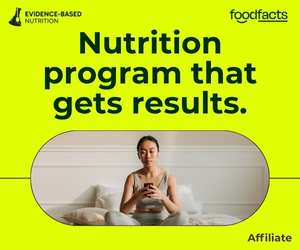
Paul Saladino M.D says "Champions need meat!"





Coral Red: Mostly False
Orange: Misleading
Yellow: Mostly True
Green: True
Learn more about our fact-checking policies
On 31st of July 2024 via Instagram, Paul Saladino M.D commented on this year’s Olympic Games and the marked increase in plant-based meals offered, saying “champions eat meat.” He continues: “removing meat from your diet ROBS you of many vital nutrients (vitamins, minerals, peptides) needed for optimal performance and health…”
Plant-based diets, when well-planned, can also meet the nutritional needs of athletes and support optimal performance.
There is no single diet that fits everyone’s needs or health profile. This is especially true of professional athletes, whose diets need to be carefully and individually planned to meet specific requirements. To truly understand the nuanced relationship between diet and athletic performance, delve into the evidence—or lack thereof—behind the claim that champions require meat for ultimate success.

Look for evidence: Reliable claims should be backed by scientific studies or data.
Let’s take a closer look at how Saladino presents his argument and fact-check his claims:
CLAIM: “I challenge you to find a single athlete in this year’s Olympics who will win a medal who is vegan.”
A quick internet search reveals several examples, among which: vegan cyclist Anna Henderson won a silver medal; fencing athlete Vivian Kong Man-wai won gold; and tennis player Novak Djokovic, who doesn’t like to use the term vegan due to the associated misconceptions, also won gold.
These examples show that it is indeed possible to perform at the highest level on a plant-based diet. In addition, nutritional science is needed to answer questions such as:
How can diet support athletic performance? What adjustments might athletes need to make when transitioning to a plant-based diet?
A recent study reviewed the available evidence related to such questions, to assess whether adopting a plant-based diet could improve, or at least not impair athletic performance. Given that plant-based diets are higher in fibre, leading to better satiety, we might expect energy intake to be of particular concern in the context of athletic performance. However, the researchers (West et al., 2023) found that energy intake did not appear to be compromised, and reached similar conclusions regarding carbohydrate and fat intake. More consideration might be given to the quantity and quality of protein intake, and the authors recommended supplementation of ergogenic compounds (creatine, carnitine, and carnosine) for all athletes, and particularly for plant-based athletes. All in all, the review found that with careful planning, the adoption of a plant-based diet should not impair athletic performance.
CLAIM: “I think most if not all athletes and coaches will tell you [animal foods] are essential for optimal performance.”
This is an example of the Appeal to Authority fallacy, where a claim is implied to be true primarily because an authority figure endorses it (in this case, athletes and coaches). While experts are indeed well-positioned to provide insights in their areas of study, it becomes a fallacy when no supporting evidence is provided for the claim. In this video, Saladino does not present scientific evidence to substantiate his assertion that meat is essential for optimal performance and health. Current nutritional science and the diverse dietary practices among today’s elite athletes suggest that a variety of diets, including plant-based ones, can support optimal athletic performance.
Breakdown of the claim:
A) Meat contains essential nutrients;
B) These essential nutrients are needed for athletes to perform optimally;
C) Therefore meat is essential for optimal performance: champions need meat!
What makes this argument so persuasive is that A and B are true. Meat and other animal foods are nutrient-dense; and adequate nutrition is essential for athletes to meet their energy needs. The jump to the conclusion in C is where the issue is: just because meat contains essential nutrients does not mean that meat is itself, essential, because these nutrients can be obtained from plant sources as well.
“Research has shown that there is no difference in performance between those consuming a plant-based diet and those consuming a diet containing meat and dairy foods. No differences in strength, anaerobic, or aerobic performance have been identified.” (Lambert 2024: 174)
💡 For example, the SWAP MEAT: Athlete study from Stanford University sought out to answer the question: does a plant-based diet affect athletic performance? To do so, they separated participants into various groups, depending on the type of performance analyzed (running or resistance training), and on the allocated diet: omnivorous, plant-based incorporating meat alternatives, and whole food plant-based. The results were that “runners and resistance trainers experienced no significant change in endurance or muscular strength on two predominately plant-based diets compared to an animal meat diet.”
Another study published in the European Journal of Clinical Nutrition found similar results, and suggested that a vegan diet “could even be more effective for endurance performance” within the population studied (young healthy lean physically active women) (Boutros et al., 2020). This is because in the submaximal endurance test, where participants were asked to pedal on an exercise bike until voluntary exhaustion, vegans achieved higher values than omnivores, which the authors of the study noted could possibly be explained by a higher carbohydrate intake.
While both studies focused on recreational athletes, the results support the adequacy of plant-based diets to sustain increased energy demands, and contradict the popular belief that plant-based foods cannot provide enough or adequate nutrients to support athletic performance (Boutros et al., 2020).
CLAIM: “I don’t understand how most people reconcile this in their minds (visual of Michael Phelps’ diet, containing animal foods at every meal) that these foods that are so bad for us are the foods that athletes need to perform at the highest levels.”
In other words, if these foods are good enough (or in Saladino’s opinion, essential) for professional athletes, how can they be bad for us?
Most national nutritional guidelines recommend limiting certain animal products, like processed and red meat, because research shows that overconsumption can harm health. The saturated fat in these foods has been linked to higher cholesterol levels and an increased risk of heart disease. While athletes and non-athletes don’t need to completely avoid meat to be healthy, a healthy diet doesn’t require animal products, and consuming too much can raise the risk of heart disease.
It’s also important to understand that sports nutrition is different from public health nutrition. “Sports nutrition is methodical, calculated, and used as a tool to optimize performance” says Rhiannon Lambert (The Science of Plant-Based Nutrition, p. 175). It is very different from the average person's dietary needs. Saladino’s argument overlooks that an athlete’s lifestyle, including how they metabolise saturated fat, differs significantly from the general population’s. Public health recommendations are designed for the general population and are different to the needs of an athlete. Therefore general health and nutritional advice should not be based upon athletes’ dietary needs.
Final Take Away
Current research does not support the claim that animal-based foods, more specifically meat, are necessary for athletes. Studies indicate that both plant-based and animal-based diets can effectively support athletic performance. Regardless of preferences, athletes’ dietary needs should be carefully planned and individualized to support optimal performance and health.
We have contacted Paul Saladino for comments and are awaiting a response.
Stand Against Nutrition Misinformation
Misinformation is a growing threat to our health and planet. At foodfacts.org, we're dedicated to exposing the truth behind misleading food narratives. But we can't do it without your support.
Sources
Boutros, et al. (2020). Is a vegan diet detrimental to endurance and muscle strength? https://doi.org/10.1038/s41430-020-0639-y
Lambert, R. (2024). The Science of Plant-based Nutrition: How to Enhance the Power of Plants for Optimal Health. London: DK.
Li, Y. et al. (2015). Saturated Fats Compared With Unsaturated Fats and Sources of Carbohydrates in Relation to Risk of Coronary Heart Disease: A Prospective Cohort Study. https://pubmed.ncbi.nlm.nih.gov/26429077/
Mezincescu, A.M., Rudd, A., Cheyne, L. et al. (2024). Comparison of intramyocellular lipid metabolism in patients with diabetes and male athletes. https://doi.org/10.1038/s41467-024-47843-y
Roberts, A. K., et al. (2022). SWAP-MEAT Athlete (study with appetizing plant-food, meat eating alternatives trial) - investigating the impact of three different diets on recreational athletic performance: a randomized crossover trial. https://doi.org/10.1186/s12937-022-00820-x
Stanford Medicine: https://med.stanford.edu/nutrition/research/completed-studies/SWAPMEAT-athlete.html
West, S., et al. (2023). Nutritional Considerations for the Vegan Athlete. https://doi.org/10.1016/j.advnut.2023.04.012
World Cancer Research Fund International. “Limit red and processed meat.” https://www.wcrf.org/diet-activity-and-cancer/cancer-prevention-recommendations/limit-red-and-processed-meat/



foodfacts.org is an independent non-profit fact-checking platform dedicated to exposing misinformation in the food industry. We provide transparent, science-based insights on nutrition, health, and environmental impacts, empowering consumers to make informed choices for a healthier society and planet.

Was this article helpful?
















.svg)
